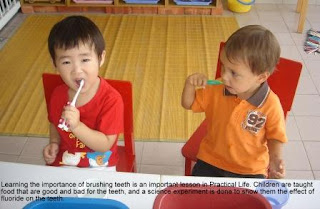Practical Life activities can be as simple as pouring and transferring beans / rice/ sand/ water from one container to another with different utensils. They can also involve many other lifeskill activities in our daily lives. Many parents may have mistaken Practical Life as play, but it is not. It is a set of skills to help children get around the world. What else? Let me do a quick review here:
The main aims of Practical Life activities are to:
2. Develop eye-hand coordination.
3. Develop concentration level -- While concentration level is developed, there is always repetition in order for them to master the skill.
4. Develop independence -- This is definitely achieved once they master the skill. They will be very happy to do things for themselves. So, no help from anyone please.
5. Develop self-confidence -- Yeah! They feel so good about themselves that they are eager to do things for themselves and people around them. This also initiates the love of learning in other areas like science and math, because they are confident!
6. Pincer grip -- Their small muscles in the first three fingers (thumb, index and middle fingers) are strengthened when they do practical life (think about it, don't you use these fingers much more than the ringman and pinky? E.g., cutting with scissors, using chopsticks, holding pencil while writing). **This prepares them for writing later on.**
Children at work @ Clover (Montessori, Johor Bahru)

Celeste was transferring and sorting small little beads with a tweezer. High level of concentration is needed in order to develop the eye-hand coordination. Look at her "do not disturb me" look :).


What a good helper Jia Le will be at the kitchen next time. He will have no problem filling up his tum even when he goes for a camping trip.
Learning how to take care of themselves is another important Practical Life lesson. Brushing teeth is a must-learn lesson. Heard from Tristan's mom that Tristan has been taking initiatives to brush his teeth after this lesson. Great impact!









